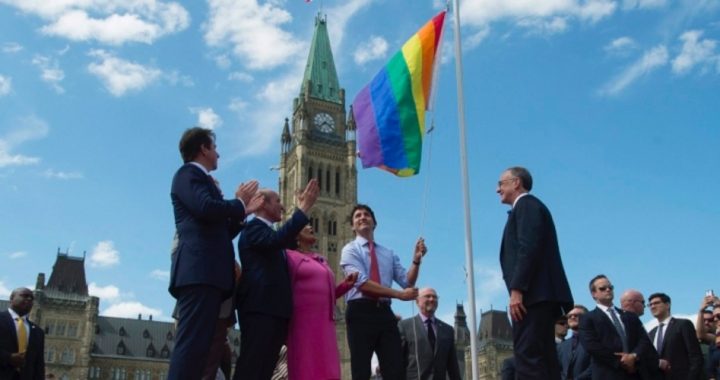
Canadian Prime Minister Justin Trudeau’s “hate-speech” bill is working its way through the legislative process and is expected to become law in the coming weeks. The bill, C-16, would amend current laws to make it a “hate-crime” — punishable by up to two years imprisonment — to speak out against transgenderism. Canada has enforced similar laws that ban “hate-speech” against homosexuals.
This legislation has failed several times before, but the difference this time is that the bill has the support not only of the Liberal Party (which Trudeau leads) but of the Conservative Party, which has previously opposed the bill. According to a May 20 report in the Moose Jaw Times Herald, members of a homosexual activist group there are “optimistic.” From that article:
“There’s a little bit of apprehension because the last time and the time before and the time before, it was defeated,” said Nillin Dennison, chair of the board of Moose Jaw Pride. “However (interim Conservative Party leader) Rona Ambrose has come forward in recognizing that this support and this protection needs to be there, and she’s said some really wonderful and supportive things, so it’s looking positive.”
Earlier this week, the Liberal government introduced Bill C-16, which is aimed at protecting legal and human rights for gender diverse and transgender Canadian citizens under the Criminal Code and the Canadian Human Rights Act.
Perhaps one of the worst elements is the further stripping away of what is left of religious liberty in Canada.
In 2005, Canadian street preacher Bill Whatcott was dragged before a Human Rights Commission for distributing pamphlets calling homosexual behavior a sin. After being found guilty, he appealed. The case went back and forth until 2013 when his conviction was upheld. The Canadian Supreme Court ruled that by making “reference to respected sources (in this case the Bible) to lend credibility to negative generalizations,” Whatcott had used “vilifying and derogatory representations to create a tone of hatred” against homosexuals. The court ruled that Whatcott’s religious beliefs did not excuse his use of “hate propaganda.”
The Canadian Human Rights Act does not currently include language to make it a “hate-crime” to speak out about transgenderism, but Trudeau’s bill — if passed — will change that.
The New American spoke to Father Paul McDonald, a Catholic priest in the Diocese of St. Catharines in Ontario, to ask him how this law, if passed, would affect him and the other priests in Canada as they perform their duties. Fr. McDonald said that the finer distinctions in all of this are important. Take the word transgenderism, for instance. The “ism” part of that word is perhaps more troubling than the “transgender” part. “Homosexualism is not just some poor person who has fallen into the sin or is addicted to the sin or has difficulties in this area, but someone who has a philosophy — which is what an ism is — and is trying to explain why it is not wrong or even why it is praiseworthy,” Father McDonald explained, adding:
There is already legal protection about homosexuality, for example. But the priest is obliged to teach those things which the faithful must believe and do in order to be saved. And under “do” is also included “do not.” So, the priest must tell the truth in these matters. Which is pretty clearly stated in the Catechism of the Catholic Church. Although I don’t think the Catechism specifically addresses the whole transgender thing, I would say it covers it because if a person has a weakness in that area then that would be an occasion of sin for them because surely that puts them in danger of — to speak very technically — seeking venereal pleasure outside of the only place where it is allowed, which is in the act of intercourse between a man and a woman who are married to each other and which is not being deliberately rendered infertile. So that is the only place where deliberate sexual pleasure is allowed and God put it there to encourage the real act with the possibility of the procreation of children and also to bond the man and woman together.
When asked whether this law would change anything about the way he preaches or counsels his parishioners, Fr. McDonald said, “It just adds a new element,” and added, “it doesn’t change our duties, because if they make some law saying you can’t speak out against abortion, then obviously you still have to speak out against abortion.” Fr. McDonald said the Catholic Church requires that the priest teach moral absolutes in regards to sexual matters, even if that teaching violates the law, “and if you have to go to jail, then you have to go to jail.”
Of course, going to jail for simply stating what one’s religion teaches is not an attractive prospect for anyone. Fr. McDonald would not want to “unnecessarily” put himself in that position because, as he said, “I wouldn’t want my people to be without a priest.” While the subject of transgenderism would not likely be a topic for an entire homily, Fr. McDonald said he would not exclude it either:
There is a place for prudence; even our Lord said to the apostles, “I have other things to tell you, but you are not ready for them.” And even pope St. Pius X quoted that in an encyclical, but then he added, “but you can’t wait forever.” Eventually you have to say these things.
In preaching, I’m not sure I would preach a whole sermon on transgenderism. I would just include it as part of a sermon. I think the safest way in order not unnecessarily to be arrested — because I wouldn’t want my people to be without a priest — is to just present it as, “OK, God created sexual pleasure and here is the one and only place where deliberate sexual pleasure is allowed. So anything contrary to that is wrong and is harmful to the human being.”
Fr. McDonald said that in a sermon, he would include transgenderism in the list of those things which the Catholic Church teaches as being outside of the proper boundaries of sexual pleasure. “The only place for deliberately sought sexual pleasure is within marriage and the natural act between man and woman,” he said, adding, “So, therefore, whatever is contrary to that — premarital sex, artificial contraception, homosexual activity, transgenderism, etc. — would all be forbidden.”
What about the idea of a “transgendered woman” who was born a man, but now “identifies” as a woman who is attracted to other women and therefore is not a homosexual in the sense that the word has always been applied up until now? Fr, McDonald said, “On a very practical level I would say, ‘No. He is not a woman. He is not allowed to go into a women’s bathroom or changing room.’” He went on to say, “They say it’s simply so that a person can be comfortable in his own skin. But really isn’t about some kind of sexual pleasure that they derive from it? So, just like a heterosexual man would have to be told, ‘No, you can’t go to the strip club because that is a proximate occasion of sin for every flesh and blood man.’ So, [the transgender man] says, “Well, that doesn’t appeal to me, but can I dress up in women’s clothes?” The answer would be, “No. You may not.”
Most of these “instructions to the faithful” would be handled in the confessional, which Father McDonald says still has some legal protections, since priests are obligated to protect what they hear in confession. This “seal of the confessional” is absolute in Catholic teaching, but has come under legal attack from those outside the Catholic Church. “Now, when this is just in private conversation with the priest [as in confession], I think the priest would have some protection,” he said, but added, “but [the government] doesn’t really care about respecting the seal of the confessional anymore anyway. They’re always trying to whittle away at that.”
Also, since this issue is so often framed in regards to the “comfort” of transgendered people being able to dress the way they want and use whichever intimate facilities they “identify with,” Father McDonald asks, “What about the comfort of the other people?” He went on to say:
It’s funny how this transgender stuff seems to be trumping “good old-fashioned feminism.” For instance, men are not allowed to have a “men’s only” gym. However, women are allowed to have a “women’s only” gym and I don’t begrudge them. But then the transgendered fellow — that is XY chromosome — he gets to go into the women’s changing room in the women’s gym? Why don’t the feminists trump the transgenders? Because surely some of these women would be saying, “No way, we fought for this, and no, you can’t come in here.”
As to the “hate-speech” element of calling aberrant sexual behavior a sin, Fr. McDonald said that’s a strange definition of hate, “because charity requires the proclamation of the truth of God.” Since the Catholic Church teaches that all sin — sexual or otherwise — is harmful to people, Fr. McDonald says it is important to tell people the truth about their sin and not encourage it in the name of tolerance, “Because we want to make sure that we’re not just saying that it’s some law that’s being broken. Yes, it is, but whatever God has told us is wrong in the moral realm is obviously going to be harmful to human beings.” He added, “If a person has a weakness in that area then that would be an occasion of sin for them.”
Fr. McDonald — much as any Canadian minister (Catholic, Protestant, or otherwise) — is familiar with the ways Canada’s laws have been used to silence the voice of religion. “We do have Human Rights Commissions here in Canada,” he said, adding, “And so, what they do is they pull you in front of the commission and you pay all these lawyer’s fees — and let’s say you win at the end of it — yeah but your time was taken up for a year and a half and you don’t get reimbursed for your lawyer’s fees.” He said this is a way of financially “destroying people.”
Trudeau’s C-16 will make those attacks more common, since it will add yet one more group which can claim injury by having its aberrant behavior denounced as harmful. The law will also likely put ministers from many religious institutions in jail for simply proclaiming what their faiths believe.
Fr. McDonald can see the United States from where he lives. If this legislation passes, it may only be a matter of time before it — and its consequences — are exported here. God help us all.
Photo of Canadian Prime Minister Justin Trudeau (red tie) taking part in “pride” flag-raising ceremony on Parliament Hill: AP Images




